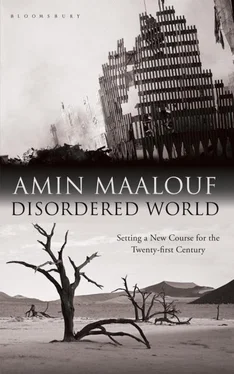We are no longer in the traditional scenario of the South offering cheap but inefficient labour. If Chinese and Indian workers are still less demanding and may remain so in the foreseeable future, they are better and better qualified and highly motivated. Are they less inventive, as is often claimed in the West, sometimes with a heavy hint of cultural or ethnic prejudice? If that is still the case today, the situation is likely to change as the men and women of the South become more self-confident, freer and less hampered by social hierarchies and intellectual conformity. Within a generation or two they could go from imitation via adaptation to innovation. The histories of these great peoples reveal that they are capable of it: porcelain, gunpowder, paper, the rudder, the compass, vaccination and the concept of zero are all testament to that. What these Asian societies once lacked they have now acquired or are in the process of acquiring under Western guidance. Freed from the caprices of power and opposition to change, having suffered the defeats, humiliations and poverty of the past, they seem at last ready to face the future.
The West has won; it has imposed its model. But by its very victory, it has lost.
Perhaps it would be useful to distinguish here between the universal, diffuse and implicit West, which has invaded the souls of all the nations of the earth, and the particular, geographic, political, ethnic West of the white nations of Europe and North America. It is the latter which today finds itself at an impasse, not because its civilisation has been overtaken by others, but because it has been adopted by others, depriving it of what constituted its specificity and superiority up to now.
With hindsight, perhaps we shall say that the attraction exerted by the Soviet system on the countries of the South paradoxically delayed the decline of the West. As long as China, India and many other centrally planned economies of the Third World remained prisoners of an economic model that did not work, they did not represent a threat to the West’s economic supremacy — they in fact thought that they were fighting against it. They had to free themselves from that illusion and resolutely follow the dynamic path of capitalism before beginning to challenge the ‘white man’s’ supremacy in earnest.
The Western nations experienced a golden age without realising it when they were the only ones who possessed an economic system that worked. In the competitive global environment that they did all in their power to create, they now seem condemned to dismantle entire sectors of their economy — almost all of industrial manufacturing has gone, along with a growing part of the service sector.
The situation is particularly acute for Europe, which, to put it simply, is caught in the crossfire between Asia and the US, by which I mean between the commercial competition of the emerging nations and the strategic competition of the US, whose effects are felt in cutting-edge industries such as aeronautics and military technology. To that we can add the further considerable European handicap: its lack of control over its gas and oil supplies, most of which are concentrated in the Middle East and Russia.
Another important consequence of the economic take-off of the Asian giants is that now millions of people have access to a style of consumption from which they were previously excluded.
One can smile indulgently or become outraged at certain excesses, but no one can legitimately deny these people the right to own what people in rich nations have long owned — fridges, washing machines, dishwashers, and all the products that go with them; hot water to wash in, clean water to drink, plentiful food; also medical care, education, leisure time, travel, and so on.
Unless bloody and absurd tyrannies are established across the planet to return these nations to poverty and servitude, I do not see how they can be prevented from doing what for decades they have been encouraged to do: work harder, earn more, improve their lives, and consume more and more.
For several generations, including my own, and especially for those of us who were born in the countries of the South, the struggle against underdevelopment was the logical extension of the struggle for independence. Independence seemed the easier challenge; the hard battle against poverty, ignorance, incompetence, social apathy and epidemics seemed as though it would take centuries. That the most populous nations have been able to take off before our eyes represents a sort of miracle which never ceases to amaze me.
That said, I must add on a less subjective note that the dizzying growth of the middle classes in China, India, Russia and Brazil — and all over the planet — is a reality which the world as it currently works does not seem able to accommodate. If in the near future three or four billion human beings were to begin consuming per capita as much as Europeans or Japanese by head of population — not to mention Americans — it goes without saying that we would see the world go even further off course, ecologically as well as economically. I scarcely need add that I’m not talking about some distant future but the immediate one, perhaps even the present. The pressure on natural resources — especially oil, water, raw materials, meat, fish, cereals, etc — and the struggles over the regions where they are produced; the determination of those who have them to hold on to them, and of those who do not to acquire them; all this provides enough fuel for innumerable deadly conflicts.
There is no doubt that these tensions will be lessened in a period of global economic recession in which we will consume less, produce less and worry less about resources running out. But that relative lull will be more than compensated for by the tensions produced by the crisis itself. How will nations respond if their hopes of economic development are subject to a sudden brutal interruption? What social upheavals, what ideological and political follies, what military campaigns would such frustrations lead to? The only similar event to which we can compare this is the Great Depression of 1929. That led to social cataclysm, to an unleashing of fanaticisms, to local conflicts, and to a worldwide conflagration.
We can reasonably hope that the most extreme scenarios will not be repeated. But there will inevitably be shocks and upheavals from which humanity will emerge transformed; no doubt battered, bruised and traumatised, but perhaps also more mature, more adult and more conscious than before of sharing a common adventure on its frail raft.
The reduction of the West’s share of the world economy, which began towards the end of the Cold War, has been accompanied by serious consequences which even now are not yet fully measurable.
One of the most worrying is that Western powers, especially the United States, seemed tempted to preserve through military superiority what they could no longer preserve through economic superiority or moral authority.
This may be the most paradoxical and perverse consequence of the end of the Cold War: an event that was supposed to bring peace and reconciliation has in fact been followed by a whole sequence of conflicts, with America going from one war to another without pause as though that had become the method of governance for the world’s only superpower rather than a last resort.
The deadly attacks of 11 September 2001 do not fully explain this tendency. They may have reinforced it and partially legitimised it, but by and large it was already under way.
In December 1989, six weeks after the fall of the Berlin Wall, the US intervened militarily in Panama against General Noriega. This expedition resembled a police raid and served as a warning: no one should be under any illusion about who was in charge of the planet and who had simply to obey. In 1991 there followed the first Gulf War; in 1992–3 the ill-fated mission in Somalia; in 1994 the intervention in Haiti to install Jean-Bertrand Aristide in power; in 1995 the war in Bosnia; in December 1998 the massive bombing campaign in Iraq dubbed ‘Operation Desert Fox’; in 1999 the Kosovo conflict; from 2001 the war in Afghanistan and from 2003 the second Gulf War; in 2004 another intervention in Haiti, this time to remove President Aristide. And that doesn’t even include the punitive bombings or smaller-scale military actions in Colombia, Sudan, the Philippines, Pakistan and elsewhere.
Читать дальше












